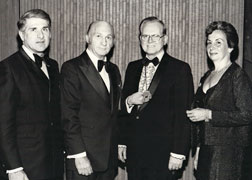Library gift shows changes in pharmacy field
For prescription-bearing patients in today’s pharmacies, the consultation area is a safe haven for private discussions. Until 1960, however, these welcome areas rarely existed, and patients relied on their physicians for education about drug interactions and medication side effects.
The role of the pharmacist was that of a chemist, said Victor A. Yanchick, Ph.D., dean of the Virginia Commonwealth University School of Pharmacy. “We weren’t even to mention the name of a drug to the person getting the prescription. We never had a record of what patients — then called ‘customers’ — were taking.”
Eugene V. White (B.S. ’50), he said, changed the way pharmacists practiced. “He really moved the profession light-years ahead of where we were at the time by developing a profile on each of his patients.”
White’s vision didn’t stop with record keeping. He removed the soda fountain, greeting cards and sundries from his pharmacy in Berryville, Va., and viewed the pharmacy as an integral part of health care and wellness.
“My father saw early on that patients were getting pushed aside for people buying cameras and other things,” said daughter Lynda White. “That’s why he made the decision to change his own pharmacy. He thought pharmacists were in a patient-care profession not a sales profession.”
White’s detailed index cards documenting his patients’ medications helped serve as a model for today’s computer-based health records management systems. He dedicated private space for patient consultations long before the practice was commonplace at pharmacies across the country.
White, who died in December 2011, donated his extensive collection of personal items to VCU’s Health Sciences Library for the Health Sciences in 2010.
“The collection covers the bulk of his career, including materials dating from the late ’50s to his retirement in the mid-’90s,” said Jodi Koste, archivist and head of resources and operations at Health Sciences Library.
The collection includes photos of the Berryville pharmacy before its transformation and correspondence with people throughout Virginia, across the country and around the world.
“Many people were fascinated by his concepts and wrote to him. The collection documents his practice as a pharmacist and his interest in the pharmacy profession. He was a pioneer in changing the practice of pharmacy,” she said.
In addition to his personal papers, White also gave $25,000 to the library to help organize, label and describe the collection so that the public can understand the breadth and depth of the materials.
“This is a very significant gift because this is how we build our research collections. You don’t often find individuals who save their materials throughout their careers,” Koste said. “When you do find one, it’s a treasure trove. Dr. White’s is a rich collection that complements other manuscripts and archival collections that we have here at the library.”
The collection is expected to be available for viewing later this year.
A librarian, too, Lynda White took great care in helping guide her father’s significant gifts.
“VCU was his college. It has an archive, a very competent archivist and a reputation you can trust. VCU seemed the best place to send the papers because I knew they would be taken care of,” she said.
To learn more about the Health Sciences Library, contact Kimberly Separ (M.A. ’97), director of development at VCU Libraries, at (804) 827-1163 or krsepar@vcu.edu.
